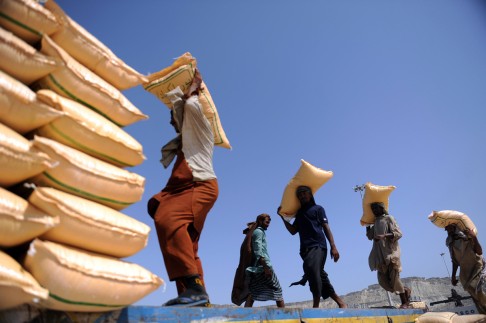
A second Shenzhen? Pakistani fishermen fear China investment plans
A move to turn the impoverished Indian Ocean port of Gwadar into a major node of world commerce threatens a population already struggling with a violent insurgency and lack of water, write Jon Boone and Kiyya Baloch
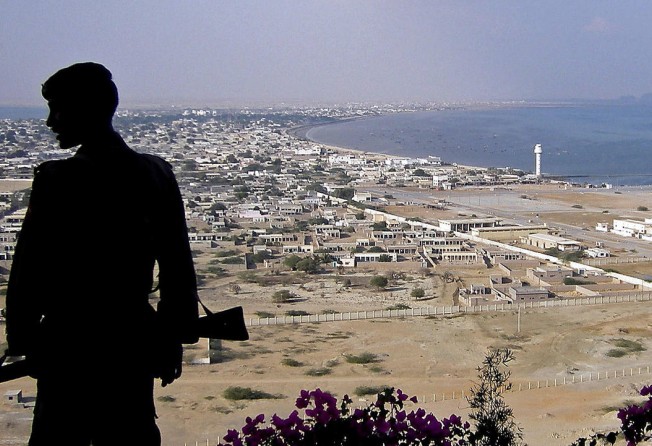
Gwadar is poor. When a house was recently burgled in the fishing settlement on Pakistan's desert coast, the only items stolen were cans of fresh water - a staple that has soared in value since local reservoirs dried up. Gwadar lies in Balochistan, a province in the grip of a long-running separatist insurgency and Pakistan's most neglected.
Yet local officials dream of a future where Gwadar becomes a second Shenzhen. Visitors are told that with Chinese investment, the small settlement will become a major node of world commerce boasting car factories, Pakistan's biggest airport and a string of five-star resort hotels along the sparkling seafront.

But residents are aghast, and not just because the fishing community, long settled on the neck of the peninsula, will be moved to new harbours up to 40km away.
"This is all being done for China, not the people," says Elahi Bakhsh, a fisherman bewildered by the plans to turn Gwadar into Beijing's deepwater access point to the Arabian Sea.
Like others he complains of chronic underdevelopment in a district judged food insecure by the United Nations in 2009 and a town with only rudimentary health and education services. Bakhsh has not had enough water to wash his clothes in weeks. He and five of his colleagues turn down an offer of tea - the mandatory accompaniment to any meeting in Pakistan - in favour of bottles of mineral water.
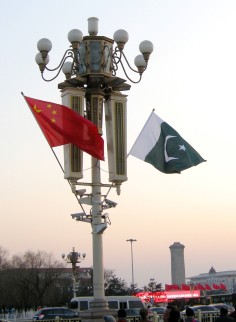
"The whole area has been captured by the government with local people pushed aside," he says.
If all goes to plan, the existing population of 80,000 will be joined by another 2 million people over the next 20 years, including 20,000 Chinese residents, according to an official at the Gwadar Development Authority.
It was Dubai, not Shenzhen, that was being touted as the model for Gwadar's future 10 years ago. But that initiative succeeded only in ruining countless property speculators. Officials say things are different this time because of the China-Pakistan Economic Corridor (CPEC), a project announced last year with pledges from Beijing of US$46 billion in investment loans.
It will help pay for the expansion of Gwadar's currently unused deepwater port and the construction of a road network - the exact route of which is subject to hot inter-provincial controversy - that will connect the port to the Chinese border 1,800km to the north, amid Himalayan peaks.
Pakistan hopes the corridor will turn the country into a critical land route for the world's second-biggest economy. In theory, exporters in the Xinjiang Uygur autonomous region, in China's northwest, will have a much shorter journey to the Arabian Sea and international markets than via the country's eastern ports. In practice, sceptics wonder whether trucking goods over one of the world's highest mountain ranges will ever be cheaper than existing sea routes. They suspect China is more interested in Gwadar as a potential naval base near the oil supplies of the Gulf.
Ensuring security on long stretches of road in a province wracked by a persistent, low-level insurgency is the biggest challenge to the CPEC. Fear of being outnumbered by outsiders from the rest of Pakistan is fuelling a violent rebellion in Balochistan.
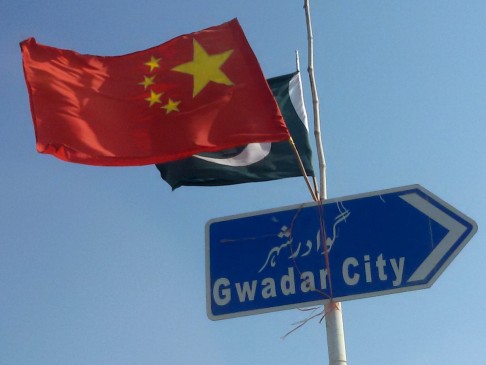
The economic corridor is a particular target because separatists see it as a demographic threat to the native Baloch, who are thought to make up just over half of the 8 million people living in the province.
"The corridor passes through what is currently the heart of the insurgency," says Kaiser Bengali, an economic adviser to Balochistan's chief minister. He says the notion that the two special brigades formed by the army will be enough to protect road traffic is "laughable".
"If every convoy of trucks has to be accompanied by half a dozen tanks, armoured carriers and helicopters the cost is going to be exorbitant," he says.
All five rebellions that have hit the province since 1947 were underpinned by Baloch claims that Islamabad exploits the province's extensive gas and mineral riches for the benefit of the country's ruling establishment in Punjab. Pakistan says arch-enemy India also stirs up trouble.
"Foreign adversaries have been more than eager to exploit any opportunity to destabilise Pakistan by harbouring, training and funding dissidents and militants," says army chief General Raheel Sharif, who joined Prime Minister Nawaz Sharif in Balochistan on February 3 for the inauguration of a section of the CPEC highway.
The current rebellion was triggered by the rape of a woman doctor by a military officer in 2005. The year before, a car bomb killed three Chinese engineers in Gwadar.
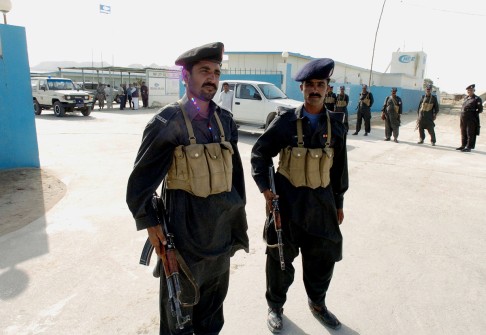
Chinese visitors say they remain worried about security despite elaborate efforts to keep them safe. Investors and officials from Beijing move about Gwadar accompanied by military vehicles and only after all the roads have been cleared of traffic. The road is picketed with policemen at 50-metre intervals.
"For the locals it's like being a prisoner in your own town," says Shamshad Ahmed, a retired army officer who has been coming to the town for years as part of his work at the Pearl Continental, Gwadar's only five-star hotel. The Pearl Continental recently reopened after being mothballed for years. "Of course they are not happy about their freedom being taken away," he says.
The sense of containment will only increase with plans to build a security fence that will completely surround the town as the port is developed.
"Everyone coming in will have to show a residency pass so we can keep a record of who lives in Gwadar," police inspector Chakar Khan explains.
Officials in Gwadar say the main town is safe, even if trouble remains in outlying areas. On January 9, two Pakistan Coast Guards officials were killed and three injured by a roadside bomb in the district.
Strenuous efforts have been made to secure the thinly populated but vast province, roughly twice the size of Guangdong. The military campaign to weaken a scrappy and deeply divided insurgency has had some success and, last year, separatist violence fell 36 per cent, to 194 attacks, according to a tally of press reports by the Pakistan Institute of Peace Studies. But critics say the army has disastrously mishandled the situation, with improved security won at the cost of deepening alienation among the Baloch. Former moderates have been driven into the hands of increasingly intransigent separatists, detractors say.
Road users complain of routine humiliations at checkpoints where busloads of passengers can be detained for hours.
It is the issue of "missing persons" that has caused the most anger. Intelligence agents, often accompanied by the paramilitary Frontier Corps, are accused of snatching suspected militants, who "disappear" into secret detention sites. Many turn up dead in deserted areas, their dumped bodies often showing signs of torture.
Last year, the provincial government revealed the bodies of 800 people linked to the insurgency were recovered between 2011 and 2014. It also estimated 950 people are still missing, although some claims go as high as 14,000, according to a 2013 report by a UN fact-finding team.
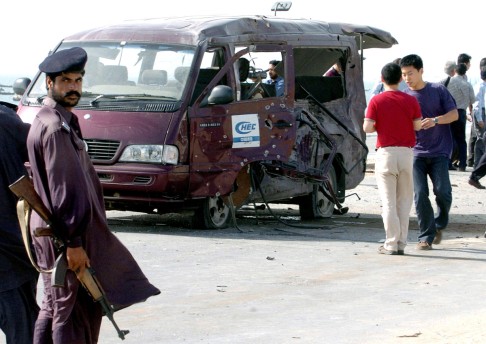
Where previous rebellions were led by tribal chieftains in northern Balochistan, who were amenable to cutting deals with the state, the current uprising is dominated by the non-tribal middle-class in Makran, the belt stretching some 200km inland from Gwadar. And unlike in the past, rebels have targeted non-Baloch civilians. Human rights groups say more than 1,000 such "settlers" have been killed since 2006, including a teacher at a school where pupils were forced to sing the Pakistani national anthem.
Civilians from Makran complain of being caught between the insurgents and the Frontier Corps, who are fighting where the infrastructure for the China-Pakistan corridor is to be built.
"Fighting erupted when work started on the road and we had to flee our homes," says Shahab Baloch, a shopkeeper from Hoshab who, like many others, was forced to find safety in a larger town. "People are living in miserable conditions but are too afraid to go back."
In the name of development they want to turn us into a minority in our own land
In a sign of the rebels' enduring local influence, just 4 per cent of voters turned out for a provincial assembly by-election in Makran on December 31 after insurgents warned people to stay away from the polls. A brother of one candidate was kidnapped while another had his house burned down.
Those who remain engaged in electoral politics have hardened their positions. Akhtar Mengal, leader of the Balochistan National Party (BNP) and a former chief minister of the province, says Pakistan's leaders "look at us worse than slaves".
"In their mind we are not a province of this country, we are a colony," he says. "In the name of development they want to turn us into a minority in our own land."
Efforts by the provincial government to negotiate a political solution with separatist leaders, some of whom are living in self-exile in Europe, are under way. But civilian politicians say they are powerless to restrain the military's counter-insurgency operations.
Moderate Baloch leaders, meanwhile, say any deal with the insurgents must include constitutional protections for indigenous people, particularly in Gwadar, where many residents feel more attachment to Oman, which owned the peninsula until 1958. Aziz Baloch, a BNP party official in Gwadar, says a system of work and residency permits should be established so outsiders would be barred from voting in elections.
Some hope the jobs and economic activity created by the CPEC will weaken support for the separatists. Many locals are sceptical, however, pointing out that people from Balochistan, with its tiny share of the national population, are entitled to only 6 per cent of government jobs and are rarely qualified for the best ones.
A newspaper advert for jobs last March in Gwadar's fisheries department offered senior technical positions to Pakistanis from Punjab and only menial roles such as cleaners and guards to locals.
"The suspicion is that all the Baloch will get from CPEC is the right to repair punctures on Chinese tyres," says Bengali, the economic adviser.
Sharif struck a conciliatory tone in December at a ceremony to inaugurate a section of the CPEC. He said Balochistan must have "the first right over all resources which have been explored in the province". But he also announced an upgrade for an existing highway running along the sparsely populated desert coast.
That would allow Chinese trucks to head east towards Karachi before going northwards on secure roads in other provinces, bypassing much of troublesome Balochistan entirely.
Guardian News & Media